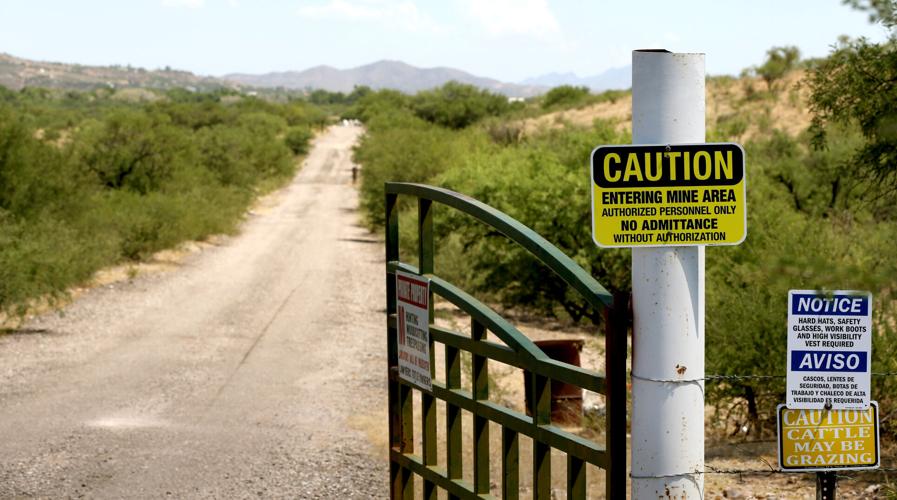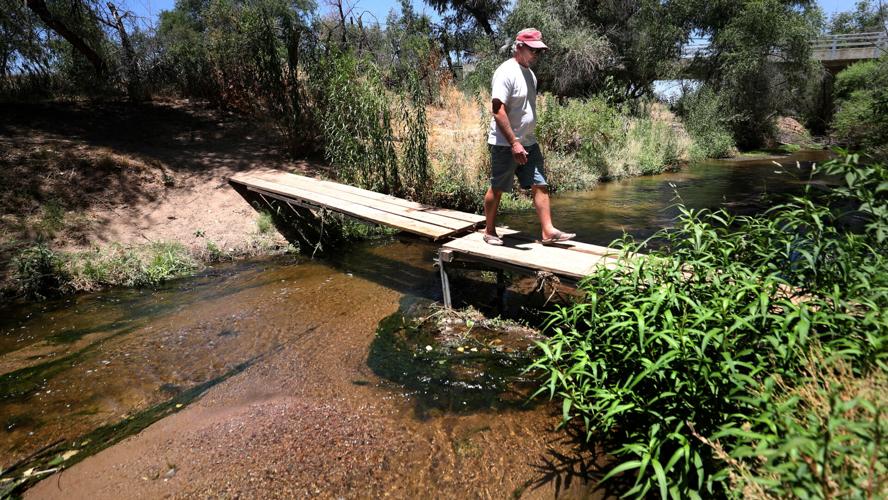Santa Cruz County officials got an earful on Tuesday from opponents of possible mine-related development in Rio Rico.
Several dozen residents spoke out against a sweeping rezoning proposal they fear would turn the community into the operations hub for a zinc and manganese mine that Australian company South32 wants to build in the nearby Patagonia Mountains.
During about two hours of public comment, the county’s Board of Supervisors heard concerns over health risks, contamination, water depletion, heavy truck traffic and the destruction of natural areas in the Santa Cruz River community about 60 miles south of Tucson.

Signs guard the lands just south of Palo Parado Road near the I-19 interchange. The section of land is among the few parcels on the west side of the highway that are part of a proposed mixed-use development stretching for miles along the Santa Cruz River valley.
At issue is a request from prominent local landowner Andrew Jackson for major zone changes along a 9-mile swath of Interstate 19 through Rio Rico to allow mixed-use commercial, residential and industrial development on vacant property currently used for ranching and farming near the river.
“There’s something special about Rio Rico,” one local resident told the county supervisors, “and you will destroy it if you let South32 and Andrew Jackson destroy it.”
The barrage of negative feedback came ahead of a presentation by Pat Risner, president of South32’s Hermosa Project in the Patagonia Mountains.
Risner said he was there Tuesday to provide an update on the project and clear up some misconceptions about the company’s plans in Rio Rico and elsewhere.
The “next-generation mine,” as he called it, would be the only operation of its kind in the U.S. and the only place outside of China capable of producing the kind of manganese needed to make batteries for electric cars and other renewable energy initiatives.
“This project is about creating a domestic supply chain for that,” Risner said.
South32 intends to build two offsite facilities to support its $1.7 billion mine: an office building on about 5 acres to house a remote operations center for the mine’s automated equipment and a processing plant on as much as 250 acres for making battery-grade manganese.
The company has committed to locating both facilities somewhere in Santa Cruz County to maximize the employment and tax benefits for the mine’s host county, but Risner said the facilities can go elsewhere if residents don’t want them there.
“We haven’t made the decision to site these anywhere, much less Rio Rico,” he said.
As for Jackson’s rezoning proposal, Risner said South32 had no part in it. “It’s not something we asked for, and it’s not something we need,” he said.
Risner pledged to host a community meeting in the coming months to address questions and concerns about the mining operation and the material it will produce.
He said Rio Rico is the company’s preferred location for its remote operations center, namely because that’s where the people they hope to train to work in the facility currently live. The battery-grade manganese facility, on the other hand, is not the sort of thing “we could put right next to the Santa Cruz River” or near homes or schools, Risner said.
He added that South32 will not select a site for the processing plant without a “dialogue with the community, and the reason that hasn’t happened yet is we’re too early in the process.”
An artist’s rendering of the facility displayed during Tuesday’s meeting included three enclosed processing structures, a warehouse, an electrical substation, an administration building, a product bagging plant and an “emergency services center.”
Risner said ore would be delivered to the facility in sealed containers built to remain intact in the event of a truck crash. Manganese processing would take place inside buildings sealed off from the outside air, though the rendering shows an outdoor “dry stack tailings” pile running the length of the facility.
Risner said South32 is committed to a range of environmental safeguards, including dust monitoring along transportation routes to and from the mine.
Actual mining at the site in mountains above Patagonia is still years away, assuming the project survives a host of legal challenges already underway.
In May, the Hermosa Project was accepted into a federal program designed to streamline reviews for critical infrastructure, but the permit process for the mine is still expected to last into 2026.

Ed Pirl walks a makeshift bridge spanning the Santa Cruz River near Rio Rico Drive, in the area being proposed for an extensive mixed-use development. Residents on Tuesday gave Santa Cruz County officials an earful about health and safety concerns about the proposal.
On Friday, eight environmental groups asked a federal judge for an injunction to halt exploratory drilling in the Patagonias by South32 and another mining company while their lawsuit over the work is heard.
The groups, most of them from Tucson, are suing the U.S. Forest Service for approving the exploration work, which they say could result in up to 7 years of around-the-clock drilling in sensitive habitat used by threatened Mexican spotted owls and Western yellow-billed cuckoos.
“Road construction and drilling should not go forward in the Patagonia Mountains before we get our day in court,” said Scott Stern, associate attorney for Earthjustice’s Biodiversity Defense Program, which is representing the eight groups. “We are asking the judge to prevent environmental damage that threatens imperiled wildlife and irreplaceable natural areas.”
Conservationists have also filed a notice of their intent to sue the Biden administration for violating the Endangered Species Act unless approval of the exploration projects is revoked within 60 days.
Only one commenter at Tuesday’s county supervisors meeting in Nogales spoke in favor of South32’s proposed mine, which she said would bring much-needed job opportunities to young people in Santa Cruz County, particularly in the Hispanic community.
Several speakers argued that no amount of economic benefit was worth the risk to the health and safety of residents.
Many Rio Rico residents have complained about being blindsided by Andrew Jackson’s massive rezoning plan, which was reviewed by the county’s Planning and Zoning Board on June 22, less than a week after a lot of people said they heard about it for the first time.
The supervisors were slated to consider Jackson’s proposal on July 11, but that hearing has since been postponed until Aug. 15.
That’s still far too soon for some county critics.
One speaker at Tuesday’s meeting said the speed at which county officials seem to be pushing the proposal is “nothing short of criminal.”
“Please slow your roll,” the man said.
The project stretches along 9 miles of Interstate 19 and the Santa Cruz River.





